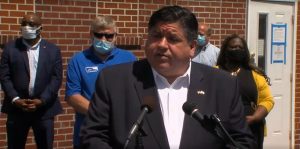Utility and food costs, summer jobs part of state emergency assistance
By Peter Hancock Capitol News Illinois — June 16, 2020
Gov. J.B. Pritzker announces the expansion of two programs that provide financial relief to low-income families and individuals, including those impacted by the COVID-19 pandemic, during a public appearance June 15in Belleville. (Credit: blueroomstream.com)
SPRINGFIELD – As Illinois prepares to enter the next phase of Gov. J.B. Pritzker’s reopening plan, his administration is launching a number of initiatives to help individuals and families who have been financially impacted from the economic shutdown brought on by the COVID-19 pandemic.
On Monday, June 16 Pritzker was in Belleville to announce the expansion of two existing programs, the Low-Income Home Energy Assistance program, or LIHEAP, and the Community Services Block Grant program, which provide food, utility and other kinds of assistance to people who are struggling financially.
“While we continue to fight to keep Illinois’ people healthy and safe from the virus, we must battle the economic pain that it has wreaked upon our communities,” Pritzker said. “Unfortunately, in this battle, we are not unique. Every state in the United States at every stage of reopening has suffered job losses and business closures, including those that never formally had a stay-at-home order.”
LIHEAP provides direct financial assistance for low-income people who are having trouble affording their utility bills. The Community Services Block Grant program offers financial help for things like food, shelter and medicine.
Both programs are operated by the Illinois Department of Commerce and Economic Activity. In the budget passed during a special session in May, lawmakers added $90 million to the programs from federal funds, bringing the total available to $275 million, and they expanded eligibility for the programs so they are now available to households with incomes up to 200 percent of the federal poverty level, or $52,400 a year for a family of four.
Pritzker also announced a new web portal, HelpIllinoisFamilies.com, where people can pre-apply for benefits under either program. Until recently, it was a federal requirement to apply in person at a local office.
Applicants will be asked for proof of employment, such as pay stubs for the head of the household for the past 30 days; copies of heat and electric bills issued within the past 30 days; a copy of their rental agreement if they are renting their home; and proof of Social Security numbers for all people living in the household.
People who need to talk with someone to walk through the application process can also call a new hotline number, 1-833-711-0374.

The Illinois Department of Human Services is offering Child Care Assistance for qualified families. The agency also is launching a summer jobs program for teens. (Photo courtesy of IDHS)
Those announcements came as the Illinois Department of Public Health reported 1,818 new confirmed cases of COVID-19 and 67 virus-related deaths during the three-day period from Friday afternoon through Monday afternoon. That’s an average of 606 new cases and about 22 deaths per day.
That brings the statewide totals to 133,016 cases, including 6,326 deaths, since the pandemic began early this year.
Laboratories have now processed more than 1.2 million tests for the virus. The preliminary seven-day statewide positivity rate for June 8-14 was 3 percent.
As of midnight Sunday, there were 1,961 COVID-19 patients hospitalized in Illinois and 569 in intensive care units, including 340 who were on ventilators.
Summer youth employment
In addition to those programs, the Pritzker administration announced another new initiative last week to help people economically impacted by the pandemic – the COVID-19 Summer Youth Employment Project.
The spread of the coronavirus disease this year, and the economic shutdown it caused, has made it especially difficult for teenagers and young adults to find summer jobs this year.
In response, the Illinois Department of Human Services has dedicated $6 million to help employ 2,200 low-income, minority and at-risk youths, ages 16-24, living in high poverty communities and counties hardest hit by the pandemic.
The money will be distributed to local organizations that contract with IDHS. They, in turn, partner with local employers in need of summer help. Participants will be placed in work-based learning opportunities, career development programs or pre-apprenticeship programs that are appropriate for their age, experience and skill level.
IDHS said it expects up to 30 projects will be funded in Champaign, Cook, Lake, Macon, McLean, Peoria, St. Clair, Stephenson and Winnebago counties.
People interested in participating can contact IDHS to find their local participating organization.
phancock@capitolnewsillinois.com







